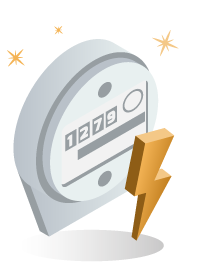10 Easy Tips on How to Save Electricity & Reduce Bills

Do you dread opening your electricity and gas bills every month? While the easiest guaranteed way to save money on your energy costs is by switching suppliers, you could also save up to £300 a year on your energy bills by following these simple steps. Here are the top ten reasons your electricity costs are too high and how to save electricity at home.
1. Change your light bulbs

One of the quickest and cheapest ways to cut your energy bills is by paying attention to which kind of light bulbs you are using in your house. If you’re still relying on old-fashioned incandescent bulbs then it’s definitely time to make a change.
Light-emitting diodes (LED) light bulbs use 80–90% less energy, provide better bright light, and can last up to 10 or even 20 times longer. Some energy suppliers will even offer LEDs as an incentive for new customers to sign up with them.
How to save electricity:
One of the easiest ways to save electricity is to switch your old bulbs as they run out for new LEDs or replace your 5 most-used bulbs today to start saving money straight away.
2. Improve your home insulation
One of your biggest outgoing expenses comes from heating your home. If your home’s not properly insulated, all the money you spend on heating will literally be going right out the window. That means spending more money to keep your house warm and the cold at bay.
While the cost of full home insulation can add up quickly, there are some cheap and easy ways to insulate your home. Using draft excluders and taping up gaps in the windows that can save you money without a great deal of investment.
For more extensive insulation, you may be able to get government support through home energy schemes such as the Energy Company Obligation (ECO) and Green Homes Grant.
How to save electricity:
Draught-excluding strips for gaps around windows and doors are available cheaply at your local home improvement store. If you can afford it, or qualify for a home energy efficiency scheme, replacing old windows and doors in your home with well-fitting, double glazed alternatives will rapidly bring down your home heating bills.
3. Replace older appliances with energy-efficient models
Since appliances account for one of the biggest chunks of your electricity bill, you should think about replacing old fashioned, inefficient appliances with energy-efficient alternatives instead.
The energy efficiency rating on your appliances tells you how efficient your home appliances are. Energy efficiency is calculated on a scale from A+++ to G, with A+++ being the most efficient.
While they may cost a bit more than older models, the new generation of appliances get the job done even better, while saving electricity and therefore money in the long run.
The Energy Efficiency Regulations establish a minimum level of energy efficiency for rented flats in England and Wales. This means that landlords must make sure that their properties reach at least an Energy Performance Certificate (EPC) rating of E before they can rent to new tenants.
How to save electricity:
Upgrading your appliances to energy efficiency rated models when they need to be replaced. Although the initial cost may be more expensive, you’ll see a huge drop in your electricity bills - you could even recoup your initial investment within one or two years.
4. Lower your thermostat

Extreme weather conditions can cause your home energy bills to rise. Cold weather snaps contribute to us keeping our heating on longer than usual.
Since you’re not in control of the weather, you have to find other ways to save electricity at home. Simple actions such as lowering your heating one degree could save you up to 5% on your winter energy bills.
You can also make use of smart home technology such as a smart thermostat, which can sense when you’re home or not and switch off your heating accordingly. By installing one, you could save up to 30% on your heating costs.
How to save electricity:
In winter, try to keep your thermostat set at about 20ºC in the living room and 18C in the bedroom. When temperatures outside drop, wrap up warm and use extra blankets on your sofa and bed before changing the thermostat.
5. Switch off devices at the mains
Standby mode is your enemy when it comes to saving money on your energy bills.
When you turn off your computer, television, mobile phone or tablet, they usually go into standby mode. This means that they don’t completely switch off. However, your devices aren’t asleep during standby. They’re regularly performing updates, downloading content, and wasting energy while you’re not using them.
How to save electricity
Purchase a smart plug adaptor that can be controlled remotely by a smartphone app or voice assistant, such as Google Assistant, Siri or Amazon’s Alexa. Instead of having to unplug everything or crawl behind heavy furniture, simply use the app to do it. You can also set a timer for the plug to turn itself off when you’re asleep.
6. Use electricity at the right time of day
Make sure that you check what type of energy contract you have. Many people are on Economy 7 tariffs when they probably shouldn’t be.
Economy 7 tariffs are special tariffs which charge you different rates for your energy during peak and non-peak hours. Usually, the “peak” rates are the most expensive.
Peak rates can depend on the area where you live and the energy company that you are with. Typical off-peak times can be 11pm to 6am or midnight to 7am. Peak hours of energy consumption happen during the day and into the early evening. This is when the utility companies experience the most demand for power.
If you are on an Economy 7 tariff but are using energy during your peak hours you may end up with a hefty bill.
How to save electricity:
If you are on an Economy 7 tariff, you should make sure you know when your off-peak hours are and stick to them when running your appliances in order to get the most out of the tariff. If more than 35% of your energy usage is during peak times then you should switch away from Economy 7 and onto a standard fixed tariff, otherwise, you are throwing money at your energy company.
7. Get a free smart meter

The cost of residential electricity and gas is always in the news – not only is it a hot topic in public, but it's also been debated in parliament. Customers have also felt the pinch even more because of the economic recession and wage stagnation in the UK, which means that many people are struggling to pay their bills.
One way to keep an eye on exactly how much you are spending is by having a smart meter installed. Energy usage is displayed in near real-time on an in-home display (IHD), allowing you to monitor which devices and appliances are using the most electricity and see where you could potentially cut back.
How to save electricity:
Get in touch with your current energy supplier about the possibility of having a smart meter installed or switch to an exclusive smart meter tariff with another provider. In most cases, you’ll be able to get the meter for free as part of the national smart meter rollout.
8. Wait until you have a full washing machine or dishwasher load
Waiting until you have a full load for your washing machine or dishwasher can go a long way in terms of saving both electricity and water. One full load will use a lot less energy and water than two half loads.
Of course, if you’re running out of clothes, you may have to put a washing machine load on anyway. In this case, we recommend choosing a short spin at 30ºC. This means less water heated to a lower temperature for a shorter amount of time.
Many dishwashers also come with an ‘eco’ mode which uses lower wash and rinse temperatures. Again, this means less energy used for heating, while minimising the amount of water required while still removing dirt effectively.
How to save electricity:
Wait until you have a full load of clothes or dishes until running a cycle. Washing one large load will use considerably less electricity and water than two medium loads.
9. Fancy a cuppa? Only boil the water you need
As a nation of tea drinkers, for many of us, there’s nothing better than being sat in front of the telly with a cuppa in the evening.
There’s even a term for the surge in demand for electricity caused by millions of us putting on a brew at the same time during breaks in our favourite shows. ‘TV pickups’ occur because our kettles are particularly energy-hungry devices.
We could save a collective £1 million per day simply by boiling only the water we need, rather than a full kettle. Not only will this save you money on your electricity bill, but it will also mean less time waiting around while the kettle boils.
How to save electricity:
Only use the water you need for the amount of tea you are making. You’ll save money, water, and time.
10. Switch your electricity provider
Six million households changed suppliers in 2020, but there are still many customers who are cautious about switching away from their current provider.
Getting a price comparison and switching energy suppliers once every year or two when your contract ends could help you score the best energy deal possible. Deals change from year to year and the contract that you had the year before may have fallen way behind in the value for money stakes.
How to save electricity:
Calling your supplier to change your tariff or doing a comparison to find a cheaper deal could help you save money on your energy bills.

